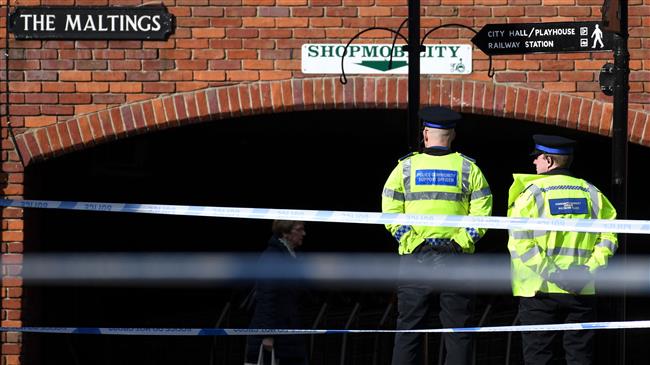Former Russian spy gravely ill in ‘suspicious’ UK incident
A former Russian spy has reportedly fallen critically ill in the UK after exposure to an “unknown substance,” British media say.
Police confirmed Monday that they had found an old man and a young girl unconscious near a shopping mall in Salisbury, about 90 miles (145 kilometers) west of London on Sunday afternoon.
The pair was then announced by the UK media to be convicted Russian spy Sergei Skripal and his daughter. The 66-year-old has an address in Salisbury.
"They are currently being treated for suspected exposure to an unknown substance. Both are currently in a critical condition in intensive care," Wiltshire Police, which is responsible for the Salisbury area, said in a statement.
Eyewitnesses told BBC that Skripal “was doing some strange hand movements, looking up to the sky" before being taken away by medical teams.
The discovery prompted police and local authorities to stage a dramatic decontamination effort that saw officers sporting yellow biohazard suits work into the night spraying down the whole street. The Salisbury hospital's emergency room was also shuttered as a precautionary step.
Accusing Skripal of spying for Britain, Russia arrested him in 2004 and sentenced him to 13 years in prison in 2006. However, the former spy was released four years later as part of a US-Russian spy swap.
He served with Russia's military intelligence before retiring in 1999. The spy then made his way to Russia’s Foreign Ministry and worked there until 2003.
After his arrest in Moscow, he confessed to the espionage charges and revealed that the British intelligence had first contacted him in 1995.
Apparently, London had paid Skripal more than $100,000 in exchange for information about the Russian military intelligence’s agents in Europe.
Russia denies involvement
Moscow has since denied having any information about the former spy’s mysterious illness.
“We don’t possess any information about what could have been the cause [of Skripal’s illness], and what this could be connected to,” Dmitry Peskov, a Kremlin spokesman, told the media, calling the incident “tragic.”
Litvinenko parallel
Despite Peskov’s comments, the British media were quick to draw parallels between this and 2006 mysterious poisoning of another Russian spy, Alexander Litvinenko.
Litvinenko, an outspoken critic of Putin who fled to Britain in 2000, died after drinking green tea poisoned with radioactive isotope polonium-210 at a London hotel.
His death plunged British-Russian relations to a post-cold war low. Moscow refused to extradite Russian nationals that London blamed for Litvinenko’s death.
Yemeni army strikes Israeli military sites with drones
‘Clock ticking’: UNRWA slams unjustifiable killing of children in Gaza
BP to be sued in Britain for supplying oil to Israel
VIDEO | Press TV's news headlines
Israeli strikes on north Gaza hospital ‘extremely dangerous, terrifying’: Director
VIDEO | Yemen targets Tel Aviv with Palestine 2 missiles
Pezeshkian: Iran resolved to complete North-South Transport Corridor
VIDEO | Iran-Syria: For Resistance











 This makes it easy to access the Press TV website
This makes it easy to access the Press TV website